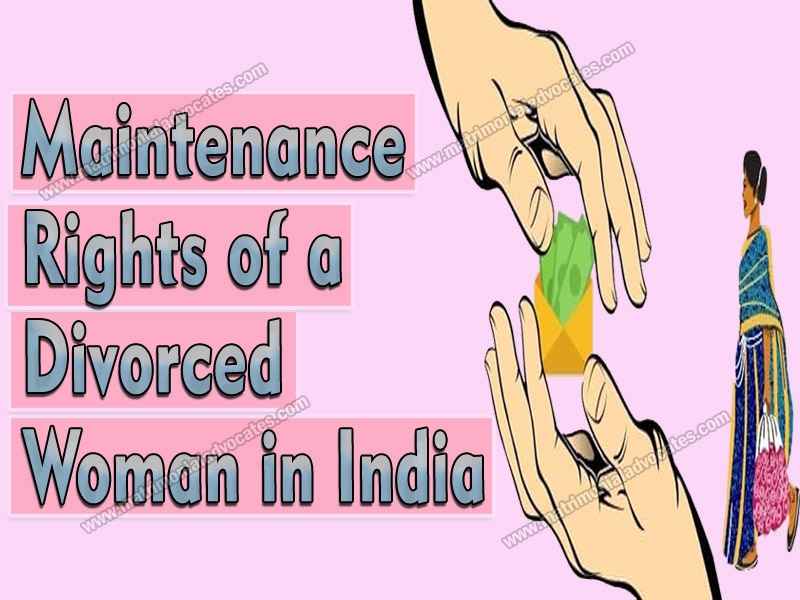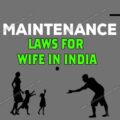
Maintenance is an amount payable by the husband to his wife who is unable and incapable to maintain herself upon separation or divorce.
The amount of maintenance is either fixed by the Court or it is agreed mutually between the parties before finalizing the divorce.
Under the Section 125, Code of Criminal Procedure, 1973 a husband is supposed to maintain his wife if the following conditions are satisfied :-
- The wife is unable to maintain herself.
- The husband has sufficient means to maintain the wife
- The husband is neglecting his duty to maintain the wife.
Maintenance under different Personal Laws
Since India is a secular nation in which there are diverse people who follow different religions. As a result there are different personal laws dealing with maintenance to a divorced woman.
Maintenance under Hindu Law
- Under the Hindu Marriage Act, 1955 and Hindu Adoption and Maintenance Act, 1956 a divorced woman has a right to claim maintenance from her husband.
Maintenance under Muslim Law
- The law that governs the maintenance under Muslim Law is the Muslim Women (Protection of Rights on Divorce) Act, 1986
- Under muslim law the term used for maintenance is “Nafaqa”.
- The husband is liable to maintain his wife under the Muslim personal laws law despite the fact whether the wife has sufficient means to maintain her or not.
- Under the muslim law the husband is supposed to maintain the wife during the Iddat period.
- Iddat refers to the period of chastity a woman is required to observe after her divorce. The period extends to 3 months.
- In case the woman was expecting a child during the divorce, then the wife is entitled to maintenance for at least 2 years from the date of birth of child.
Maintenance under Christian Law
Maintenance under Christian law is governed by Indian Divorce Act, 1869.
- The maintenance law under the Christian laws prescribes that the maintenance to a divorced woman can not exceed one fifth of the total estate of the husband. Provided, the wife does not remarry and stay chaste.
Maintenance under Christian Law
- The Parsi Marriage and Divorce Act, 1936 recognizes the right of wife to maintenance-both alimony pendente lite and permanent alimony. The maximum amount that can be decreed by court as alimony during the time a matrimonial suit is pending in court, is one-fifth of the husband’s net income.
Filing of the maintenance application
This can be done by submitting your marriage certificate along with the photos of your marriage as evidence. By following these essential requirements you can file a case under Section 125 Cr.P.C. before the family court or judicial magistrate nearest to your residence.
Where an application for maintenance can be filed
An application for maintenance under Section 125 Cr.P.C. can be filed before a Judicial Magistrate of First Class in the district where the husband or the wife resides or where they used to reside.
When an application for maintenance can be filed
After getting a divorce or during the divorce process an application for maintenance or file for divorce can be filed.
Contents of Maintenance Application
The application by wife Under Section 125 of Cr.P.C for maintenance will contain the following:-
- Any details of previously obtained maintenance order under personal laws.
- Conduct and behavior of the husband.
- Details of children, if any.
- Details of divorce and duration of separation.
- Financial independence of the applicant and her family.
- Grounds for asking maintenance.
- Income declaration of husband.
- Marriage details and length of their married life.
- Payment details of court fees.
- Verification statement by the applicant.
Interim Maintenance (during the pendency of litigation)
In a divorce proceeding, interim relief can be provided to the wife in order to meet her immediate needs. This relief is termed as ‘interim maintenance’ or ‘pendente lite’.
- In furtherance to the Hindu Marriage Act, 1955, interim maintenance can also be sought under section 125 of the Criminal Procedure Code by the wife regarding monthly allowance for maintenance.
- In a case where the wife does not have an independent source of income, the wife, under section 36 of the Special Marriage Act, 1954, can seek expenses from her husband.
- Where the proceedings are pending under the Parsi Marriage and Divorce Act, 1869, either spouse can claim relief under section 39 of the Act.
- This provision is almost entirely similar to section 36 of the Special Marriage Act, 1954.
- Interim relief can be sought by Christians under section 36 of the Divorce Act.
Permanent maintenance
Permanent maintenance is granted by the court as per the personal laws in force in India. Once the divorce proceedings reach an end, permanent maintenance is awarded under the following provisions:
- Section 25, Hindu Marriage Act, 1955 – The applicant under this section is entitled to maintenance from the spouse. It should be paid either periodically or as a sum till the applicant either remarries or for his/her lifetime.
- Section 18, Hindu Adoption and Maintenance Act, 1956 – Under this section, the wife is entitled to maintenance from her husband.
- Section 3, Muslim Women (Protection of Rights on Divorce) Act, 1986 – This section provides that the Muslim wife be provided with fair and reasonable maintenance within the iddat period by her former husband. The amount should be equal to the amount of mahr or dower agreed to be paid at the time of marriage. In addition to this amount, the wife is also entitled to all the properties, her before or at the time of marriage or after her marriage by her relatives or friends or the husband or any relatives of the husband or his friends. In case of failure on part of the husband to pay the maintenance, the Magistrate has the power to order the husband to pay the same.
- Section 37, Special Marriage Act, 1954 – this provision is entirely similar to section 40 of the Paris Marriage and Divorce Act, 1869 with the only difference of applicability of the Act. Under the Special Marriage Act, only the wife can seek maintenance from the husband from a Court having jurisdiction under Chapters V and VI of the Act. The order may alter or rescind in case the wife remarries or is not leading a chaste life.
- Section 37, Divorce Act, 1869 – Under this section, the District Court is empowered to order the husband to pay a reasonable amount to the wife till her lifetime when a decree of dissolution or decree or judicial separation is obtained by her. Moreover, it is the responsibility of the Court to consider the fortune of the wife, the ability of the husband to pay as well as the conduct of the parties before passing such order. The Court may discharge or modify the order in case the husband is unable to pay the reasonable amount (as determined by the Court) in the future.
Grounds on which maintenance can be refused
- The wife must not be living in adultery- If the wife is committing adultery i.e. lives in a quasi-permanent union with the man with whom she is committing adultery, then she is not entitled to receive any interim allowance or maintenance. She can’t even ask for expenses of proceedings
- Wife must not refuse without sufficient reasons to live with her husband- A wife is not permitted to receive for her refusal. The reason can vary from case to case considering the circumstances. Also, if the husband has tapered marriage with another woman or keeps a mistress, this would be considered as a just ground for her refusal to live with him.
- The wife has re married after getting divorce.





